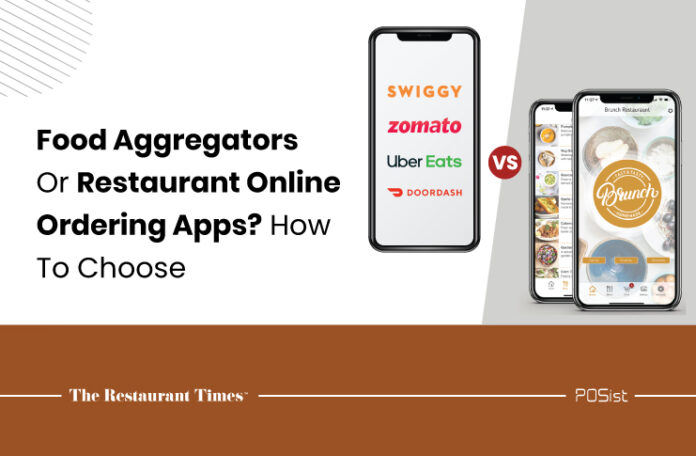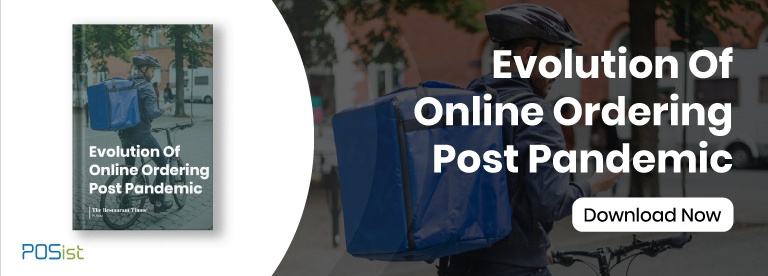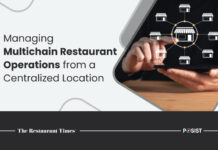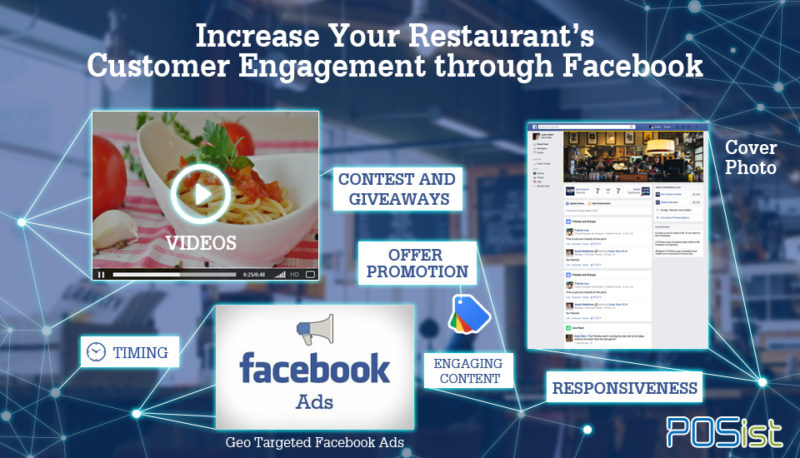Online food ordering has been booming for the past two years on the back of changing customer preferences. According to Statista, the revenue from online food ordering channels is expected to grow at a robust CAGR of 10.39% between 2021 and 2025. The data is collected from every online channel. Be it food aggregator, online ordering platform, or unique restaurant online ordering app. You don’t want to lag behind your competitors by operating in offline mode in a world where everyone is switching to online services.
When taking your restaurant business online, the two major choices before restaurant owners are food aggregators and building a unique restaurant online ordering app. While each has its own positives and negatives, your restaurant requirements should determine where you should invest. This decision must be made astutely in order to select the best solution to your needs.
This article aims to highlight the pros and cons of integrating with food aggregators and building your own online ordering app for customers to browse to help you make an informed decision.
Advantages And Disadvantages Of Integrating With Food Aggregators
Here are some of the advantages of integrating with food aggregators.
1. Restaurant Marketing
Food aggregators can prove to be an asset to your restaurant business if utilized astutely. Once you integrate with them, you are visible to the entire database of customers located in your area. Discoverability is the first step of marketing. You can further market your restaurant on food aggregators by running pay per click ads. Also, with area-based marketing, customers residing in areas located near you can be sent targeted offers and discounts.
2. Optimized Delivery
Food aggregators can streamline food delivery and help you scale your market quickly. So, integrating with them gives you a ready-to-use delivery fleet, saving you the acquisition and labor costs. This outsourced delivery is managed and optimized by the food aggregators themselves, optimizing delivery timeframes.
3. Direct Visibility To More Customers
Food aggregators have their own customer database owing to the other restaurants that are already connected to it. When you connect with a food aggregator, you get directly connected to that pre-existing customer base. This saves you the time and hassle of finding new customers, especially at the start-up stage. You can use sponsored ads and recommendations to market your restaurant through food aggregators and create brand recognition.
4. Easy Entry Into The Restaurant Market
Integrating with food aggregators gives a direct entry to your restaurant in the F&B sector. Your delivery is outsourced leaving room for you to focus on other important aspects of running a restaurant business. It takes a maximum of one week to set up your restaurant on any food aggregator platform, as opposed to growing a restaurant slowly from scratch.

However, with all the advantages, there also come disadvantages when integrating with food aggregators. Read further to know about some of them.
1. High Order-Based Commission
Integrating with food aggregators comes with a high commission. Every restaurant has to pay around 20-25% of their revenue to food aggregators as commission for the services that they avail from them. Even though the commission is worth the services they provide, when seen from a long-term perspective, it can cut down a good chunk of your sales revenue.
2. Masked Customer Data
Since customers search for restaurants directly on food aggregator sites, all the customer data remains with them, masked from the restaurants. In other words, restaurants do not have access to order-related information and thus cannot use it to their advantage. In this case, it is harder for brands to drive personalized marketing that can help them retain customers.
3. Less Control Over Customer Experience And Retention
Integrating with food aggregators transfers the control of a restaurant’s customer experience to food aggregators. There is not much that a restaurant can do to solve the problems customers face in ordering online. Furthermore, they also cannot guarantee the quality and taste of the food as there may be a variance in what they prepare and what gets delivered.
The amount of value-added services that food aggregators provide to the restaurants is one of the best parts of integrating with them. One can even say, the high commission is worth it. They further reduce operating costs by providing a delivery fleet to your outlet. However, you must not just squander your funds on this option without thinking twice about it. Calculate your requirements and then decide with an open mind if you want to invest in them.
Advantages And Disadvantages Of A Restaurant Online Ordering App
Restaurant online ordering apps provide similar services to restaurant operators but with lesser benefits. Here are some of the advantages of opting for a unique restaurant online ordering mobile application.
1. Full Control Over Customer Experience
Building your own restaurant online ordering app gives you full control over your customer experience. Since you’re in direct contact with your customers, you have all their data that can be leveraged to generate profits through segmentation and sending targeted offers and discounts. You can impact your customer experience by sending push notifications to them via your app.
2. Faster Delivery
With a branded restaurant app, it is your in-house delivery staff that delivers food to your customers. Unlike food aggregators where valets have to deliver orders from different outlets to multiple customers, your own delivery staff can collectively pick up all the orders from one place and deliver them one by one to each customer. This saves time and facilitates faster delivery.
3. Long Term Cost Saving
Unlike food aggregators, there’s no such thing as commission when you build an online ordering app. Since the app is in-house, you need not pay any commission that takes away a big chunk of your revenue. This is beneficial in the long run, as the part of your revenue that is given away to food aggregators is saved, thereby saving huge costs that can be used elsewhere.
4. Customer’s First Choice
Prominent brands like McDonald’s and Dominos have opted for their own online ordering apps. When customers order from a branded app, it means that your brand is their only choice. When that is not the case, they usually end up searching for options on food aggregators where they have numerous choices. However, since they were looking for your restaurant to order from, they landed on your unique restaurant online ordering app.

Following are some of the cons that restaurant operators may face while operating a unique restaurant ordering app.
1. Time Investment
It takes a long time to build your own restaurant online ordering app. The process is easier and faster with food aggregators as it takes only around a week to set up your restaurant on it. However, building an app demands time and one-time capital investment. Even though a branded app proves to be beneficial for bigger brands, small restaurants and cloud kitchens can not wait 3-4 months to kick start their business and earn profits.
2. Accountability
All the deliveries are facilitated by your in-house delivery fleet. The entire accountability, therefore, comes to you if the services are not right. When restaurants are integrated with food aggregators, there is a benefit of the doubt that the aggregator valet lacks competency in delivering food. However, when your own delivery staff services are incompetent, there remains no room for doubt and you are entirely accountable for your services.
3. Self-management Of Delivery Staff
Managing the delivery staff is important. With the assistance of food aggregators, this task gets easier. These companies optimize deliveries and ensure that the food is delivered in time. However, when you decide to go for your own unique restaurant online ordering app, all the responsibility comes to you. Therefore, you need to have a skilled manager who can handle and optimize your restaurant delivery in order to deliver the best and fast services.
Depending on your restaurant format and business capital, analyze what is best for your venture. If you have ample delivery staff and you are good at optimizing and managing delivery, you need not go for food aggregators, rather you can build your own restaurant online ordering app. However, if you have good capital and can invest in food aggregators to avail their diversified services, there is nothing better than that. So, decide how you want to grow your business depending upon your restaurant requirements.



















